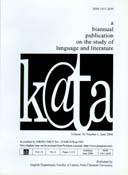Language Ideologies of Young Chinese Surabayanese’ Motivation in Learning Mandarin in Post Suharto Era
Abstract
This is the study of language ideologies of young Chinese Surabayanese’ motivation in learning Mandarin and the influence of their beliefs in Mandarin towards their sense of Chinese-ness. The approach of this study is qualitative, through semi-structured interviews and participant observation. There are four young Chinese Surabayanese participated in this study. It is found that they perceived learning Mandarin is an advantage. This advantage is then explained through their beliefs about Mandarin in four supportive points: globalising life opportunities in working and communication, mastering Mandarin caused by the rise of China, investing in their linguistic capital, and parents’ influence. Though there are two participants who feel more Chinese after learning Mandarin, but it is never their intention to be more Chinese when they start learning Mandarin. In the end, their ideology of learning Mandarin mainly focuses with the benefit and advantage instead of with their sense of Chinese-ness.
Downloads
References
Ananta, A. et al. (2015). Demography of Indonesia’s Society. Singapore: ISEAS Publishing.
Ang, I. (1998). Can One Say No to Chineseness? Pushing the Limits of the Diasporic Paradigm. Boundary 2, 25(3), pp. 223-242. doi:10.2307/303595
Bourdieu, P. (2001). Language and symbolic power (J. Thompson, Ed.; G. Raymond & M. Adamson, Trans.). Cambridge, MA: Harvard University Press. (Originally published 1991)
Chambers, G. N. (1999). Motivating Language Learners. UK: Multilingual Matters Ltd.
Dawis, A. (2009). The Chinese of Indonesia and Their Search for Identity: The Relationship Between Collective Memory and the Media. Amherst, N.Y.: Cambria Press, ISBN 978-1-60497-606-9.
Dhir, K. (2005). The value of language: concept, perspectives, and policies. International Journal, 10(4), 358-382.
Ding, S., & Saunders, R. A. (2006). Talking up China: An analysis of China’s rising cultural power and global promotion of the Chinese language. East Asia, 23(2), pp. 3–33. DOI: 10.1007/s12140-006-0021-2
Gardner, R. C. (1985). Social psychology and second language learninG: The roles of attitudes and motivation. London.
Gardner, R. C. (2010). Motivation and second language acquisition: The socio-educational model. New York, New York: Peter Lang Publishing.
Goh, Y.S. (n.d.). The Spread of Mandarin as a Global Language. Teaching Chinese as an International Language, pp. 1–17. DOI:10.1017/9781107280472.002
He, A. W. (2006). Toward an Identity Theory of the Development of Chinese as a Heritage Language. Heritage Language Journal, (4)1, pp. 1-28.
Hammill, M. J., & Diniz De Figueiredo, E. H. (2012). Language and Globalization. The Encyclopedia of Applied Linguistics. doi:10.1002/9781405198431.wbeal0598
Hoon, C. Y. (2004). How to be Chinese: Ethnic Chinese Experience a 'Reawakening' of their Chinese Identity. Inside Indonesia, 78, pp. 13-14. Retrieved from: https://ink.library.smu.edu.sg/cgi/viewcontent.cgi?article=1833&context=soss_research
Hoon, C. Y., & Kuntjara, E. (2019). The Politics of Mandarin Fever in Contemporary Indonesia: Resinicization, Economic Impetus, and China’s Soft Power. Asian Survey, 59(3), pp. 573-594.
Infographic: The Importance of Mandarin. (n.d.). Retrieved from http://www.gi2c.org/infographics/the-importance-of-mandarin.html
Izzati, F. F. (2017, May 17). Chinese-Indonesian in Surabaya, the 2017 Jakarta’s Governor Election and Future of Chinese-Indonesian’s Involvement in Politics. Retrieved from http://www.politik.lipi.go.id/kolom/kolom-2/politik-nasional/1140-chinese-indonesian-in-surabaya-the-2017-jakarta-s-governor-election-and-future-of-chinese-indonesian-s-involvement-in-politics
Kahin, A, ed. (1991). Indonesia: The Role of the Indonesian Chinese in Shaping Modern Indonesian Life. Ithaca, N.Y.: Cornell Southeast Asia Program, ISBN 978-99936-0-446-4.
Li, V. W. K. (2014). Learners' Stories: A Study of Hong Kong Post-Secondary Students’ English Learning Experiences and Identity Construction (Dissertation). Retrieved from https://ir.lib.uwo.ca/cgi/viewcontent.cgi?article=3421&context=etd
Mack, N., Woodsong, C., MacQueen, K. M., Guest, G., & Namey, E. (2002). Qualitative methods: A data collector’s research guide. In Occasional Paper Royal College of General Practitioners. DOI: 10.2307/3172595
Mahmood, D. A. H., & Hassan, Z. M. (2008). Language Learning and Learner’s Self-identity: A Psycho-Pragmatic Study of EFL Learners in Kurdistan Region. Journal of Zankoy Sulaimani Part (B - for Humanities), 19(1), 173–192. DOI: 10.17656/jzsb.10579
Ng, C. F., & Ng, P. K. (2015). A Review of Intrinsic and Extrinsic Motivations of ESL Learners. International Journal of Languages, Literature and Linguistics, 1(2), pp. 98-105.
Ngan, L. L. S., & Kwok-bun, C. (2012). The Chinese Face in Australia: Multi-generational Ethnicity among Australian-born Chinese. New York, NY: Springer.
Norton, B. (2013). Identity and language learning: Extending the conversation (2nd.). Bristol, UK: Multilingual Matters.
Palinkas, L. A., Horwitz, S. M., Green, C. A., Wisdom, J. P., Duan, N., & Hoagwood, K. (2015). Purposeful Sampling for Qualitative Data Collection and Analysis in Mixed Method Implementation Research. Administration and policy in mental health, 42(5), 533–544. doi:10.1007/s10488-013-0528-y
Ramzy, A. (2006). Get Ahead, Learn Mandarin. Time Magazine, 4-50.
Rovira, L. C. (2008). The relationship between language and identity. The use of the home language as a human right of the immigrant. Remhu - Revista Interdisciplinar Da Mobilidade Humana, 16(31), pp. 63-81. Retrieved from https://www.redalyc.org/pdf/4070/407042009004.pdf
Salmon, C. (2009). The Chinese Community of Surabaya, from its Origins to the 1930s Crisis. Chinese Southern Diaspora Studies, 3, pp. 22-60.
Setijadi, C. (2016). Ethnic Chinese in Contemporary Indonesia: Changing Identity Politics and the Paradox of Sinification, ISEAS Perspectives, 12(2016), pp. 1-11. Retrieved from: https://www.iseas.edu.sg/images/pdf/ISEAS_Perspective_2016_12.pdf
Vaish, V. (2010). Globalization of Language and Culture in Asia: The Impact of Globalization Processes on Language. Bloomsbury Publishing.
Wen, X. (2011). Chinese Language Learning Motivation: A Comparative Study of Heritage and Non-heritage Learners. Heritage Language Journal, 8(3), pp. 41-66.
Wilson, A. E. (2012). Interpreting differences in parental encouragement to learn the host language: California and Catalonia compared. Bellaterra: Journal of Teaching and Learning Language and Literature, 5(3), pp. 44-56.
Yin, R. K. (2011). Qualitative Research from Start to Finish. New York, NY: The Guilford Press.
Zhou, M. (2019). Language Ideology and Order in Rising China. Singapore: Palgrave Macmillan.
Zschomler, S. (2019). ‘Language Is Your Dignity’: Migration, Linguistic Capital, and the Experience of Re/De-Valuation. Languages 2019, 4(64), pp. 1-14.

This work is licensed under a Creative Commons Attribution 4.0 International License.
![]() This work is licensed under a Creative Commons Attribution License
This work is licensed under a Creative Commons Attribution License




.png)
.png)

.png)












